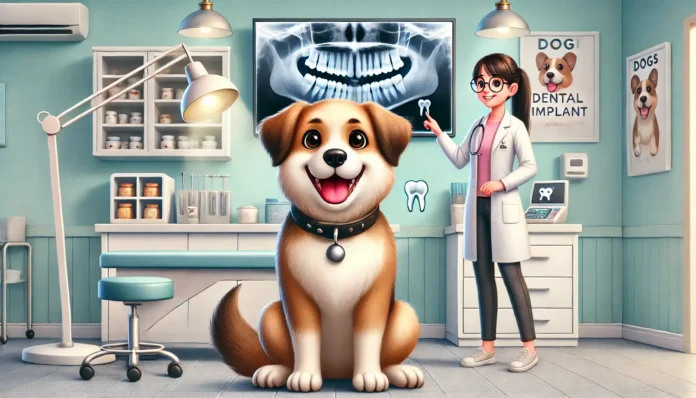Your dog’s well-being depends on healthy teeth, but what if your furry child’s tooth goes missing? So, could dental implants be the answer? In this guide, we explore everything you need to know about dog dental implants, from their benefits and the costs of dog dental implants to the alternatives.
Dental implants are not only a human luxury — they’re also being considered for dogs, helping restore chewing capacity and oral health. However, the process can be complicated and is not right for every pet. That’s why it’s important to learn how implants work, why your dog may need one, and see if this procedure is a good match for your furry friend.
In this article, we’ll discuss important factors related to dog dental implants, including the procedure and real-life success stories. We’ll also discuss the costs, potential risks, and other solutions so you can decide which is best for you. In this guide, you’ll discover everything you need to know to determine whether dental implants might improve your dog’s quality of life.
Want to keep your dog safe? Check out our guide to the Derry Dog Park Health Issue.
Now let’s get into the nitty-gritty, full picture of dog dental implants and how they can help your best friend live a longer, healthier life!
What Are Dental Implants for Dogs?
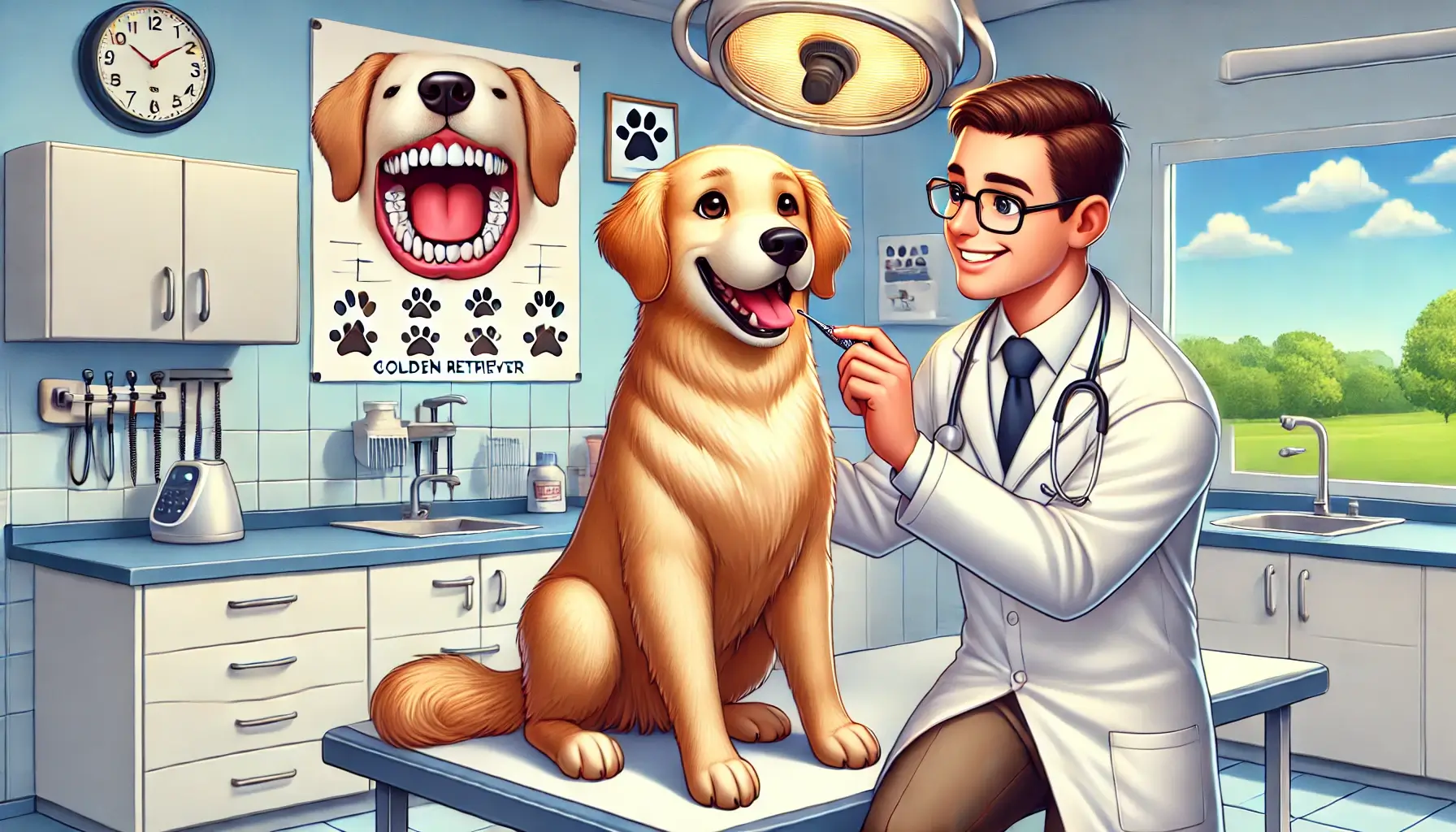
Understanding Dog Dental Implants
Dog dental implants are a type of prosthetic dental appliance designed to replace missing teeth within a dog’s mouth. They also mimic the form and function of natural teeth, so dogs are comfortable chewing and eating again. An implant consists of three parts: the titanium screw (which serves as a tooth root), the connector, and a crown (which looks like a tooth).
After that, the titanium screw is usually implanted into the jawbone which attaches to the bone over time. Once it has settled, the crown gets fitted, sealing the deal. And they are made from biocompatible materials to guarantee the safety and durability of your furry friend.
Dog dental implants are typically recommended for use on pets who suffer from extensive tooth loss or damage that affects their quality of life. However, not every dog is a candidate, as the procedure necessitates extensive evaluation and preparation.
Why Might a Dog Need Dental Implants?
Dogs may need dental implants if they’ve lost teeth due to injury, decay, or gum disease. Missing teeth can lead to chewing difficulties, which affect nutrition. Additionally, gaps in the teeth can cause jaw misalignment or further dental complications.
Some common issues leading to implants include broken teeth from accidents, advanced periodontal disease, or congenital conditions like weak enamel. For instance, if a working dog loses critical teeth, implants might help restore their functionality. In severe cases, dental implants can provide a lifeline for dogs struggling with oral pain or difficulty eating.
Can All Dogs Get Dental Implants?
Not all dogs are eligible for dental implants. Age, health, and dental condition play significant roles in determining suitability. Puppies, for example, are usually excluded due to their developing jawbones. Older dogs might face limitations if they have chronic illnesses or bone density issues.
The process begins with a veterinary evaluation. The vet examines the dog’s overall health, oral condition, and jaw strength using X-rays and physical exams. If the dog passes these checks, they may proceed with the procedure. Ultimately, only a professional can determine if implants are the right solution for your dog.
How Do Dog Dental Implants Differ from Human Implants?
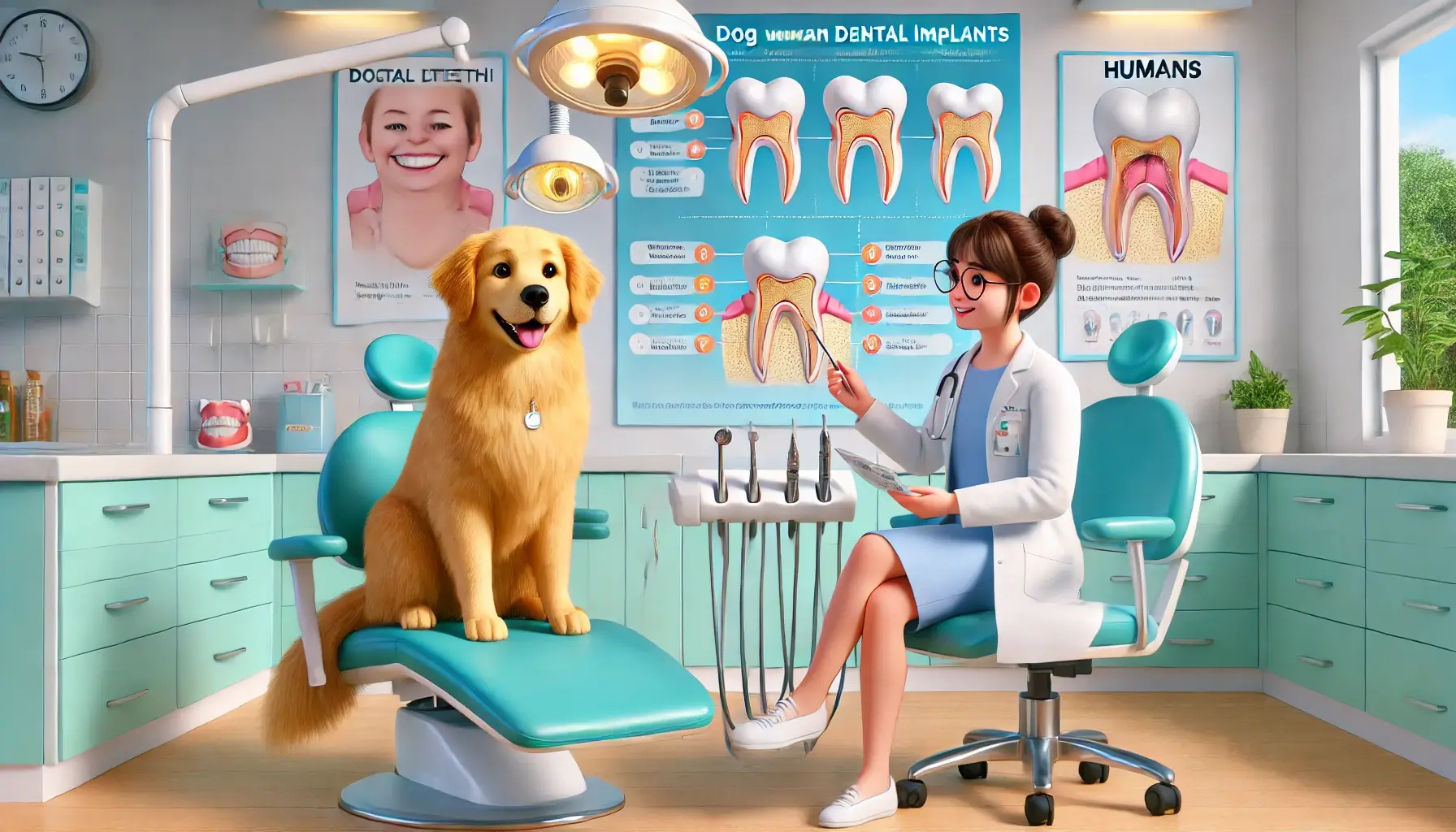
Key Differences in Procedures
Similar in purpose, there are distinct differences between dog dental implants and those used for humans. For people, it’s a matter of careful planning to bring back beauty and functionality. Form follows function when it comes to dogs.
Implants performed on humans typically take multiple sessions. For dogs, the procedure is passed through a clean-up system designed to reduce stress and exposure to anesthetics. Veterinary dental surgeons use titanium and a more rapid integration time as canines heal differently than other mammals.
In addition, dogs’ bite force and eating behavior also require a more robust design of implants.
Unique Challenges in Dogs vs Humans
While humans can tell you if something isn’t right, dogs can’t, making it more difficult to identify post-operative complications. The same goes for dogs, which have a natural inclination to chew (and chew, and chew) and use their mouths for exploration, putting them at risk of damaging their implants while healing.
The other challenge is their mouth sizes and shapes vary significantly across breeds. This diversity requires individual solutions for various dogs as well. Furthermore, oral hygiene after implantation in dogs requires more attention from pet owners to avoid infection or failure.
Benefits and Risks of Dog Dental Implants
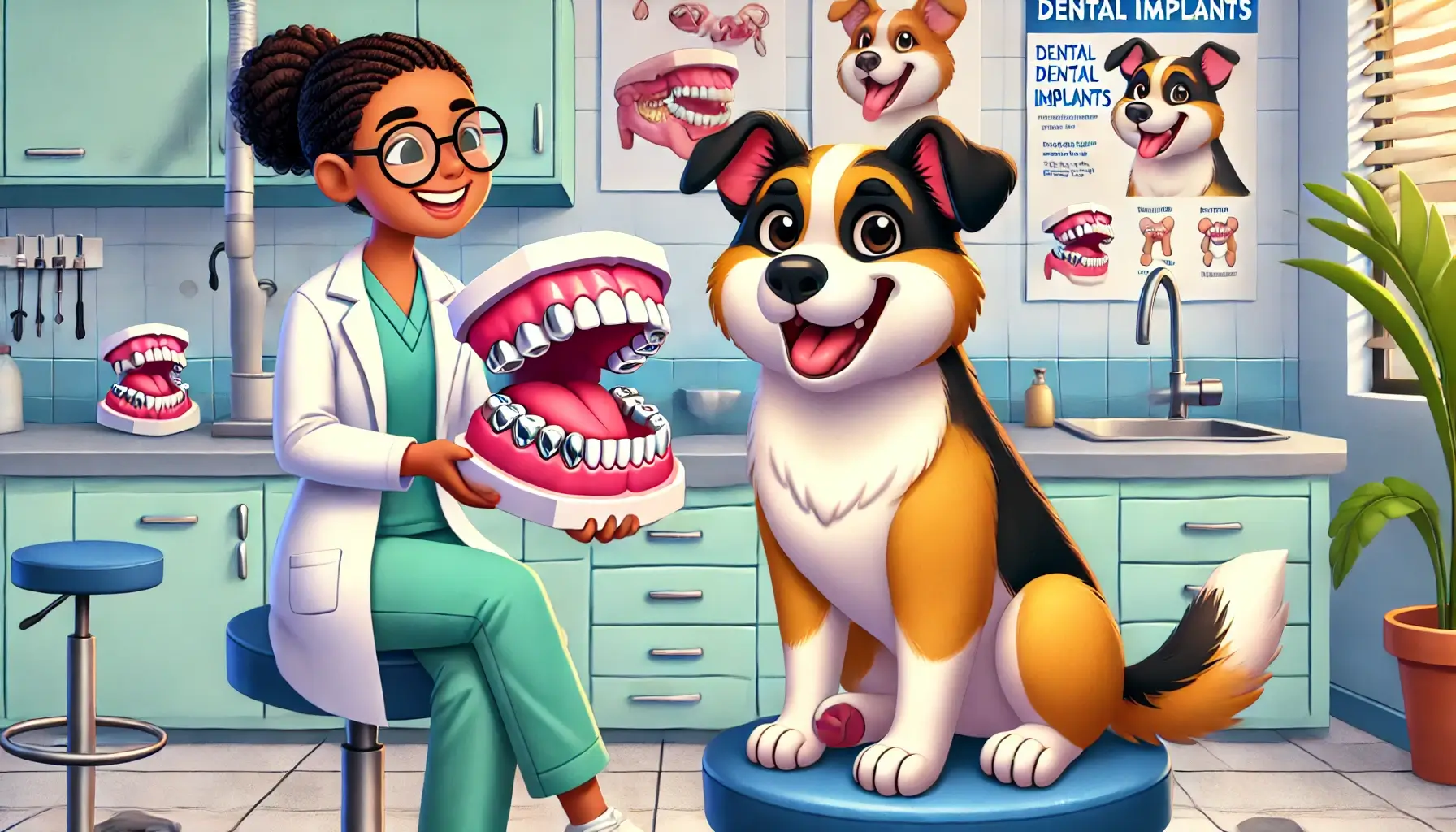
Benefits of Dental Implants for Dogs
Dental implants can be life-changing for a dog. Dogs can finally enjoy their meals again pain-free and receive better nutrition as a result. They also enhance gum health and lower the chances of additional tooth loss.
To fill the gap caused by missing teeth, thus preventing jawbone deterioration which is a common consequence when a person loses their teeth. Even more importantly, implants allow for long-term comfort, so that dogs can eat, play and engage more easily. This improves their quality of life and longevity.
Risks of Dental Implants for Dogs
Like all surgical procedures, dental implants have risks. There is a risk of infection at the surgical site, and the implant may be rejected by the body, but this is relatively rare. There may also be surgical complications, such as nerve damage or improper placement.
Long-term concerns can include loosening of the implant or inflammation of the gums if oral care is not kept up. Pet owners have to weigh these risks and discuss them in detail with their vet before deciding to go ahead with the procedure. Take care after the surgery to avoid such complications, thus leading to the success of the implant.
Cost of Dental Implants for Dogs
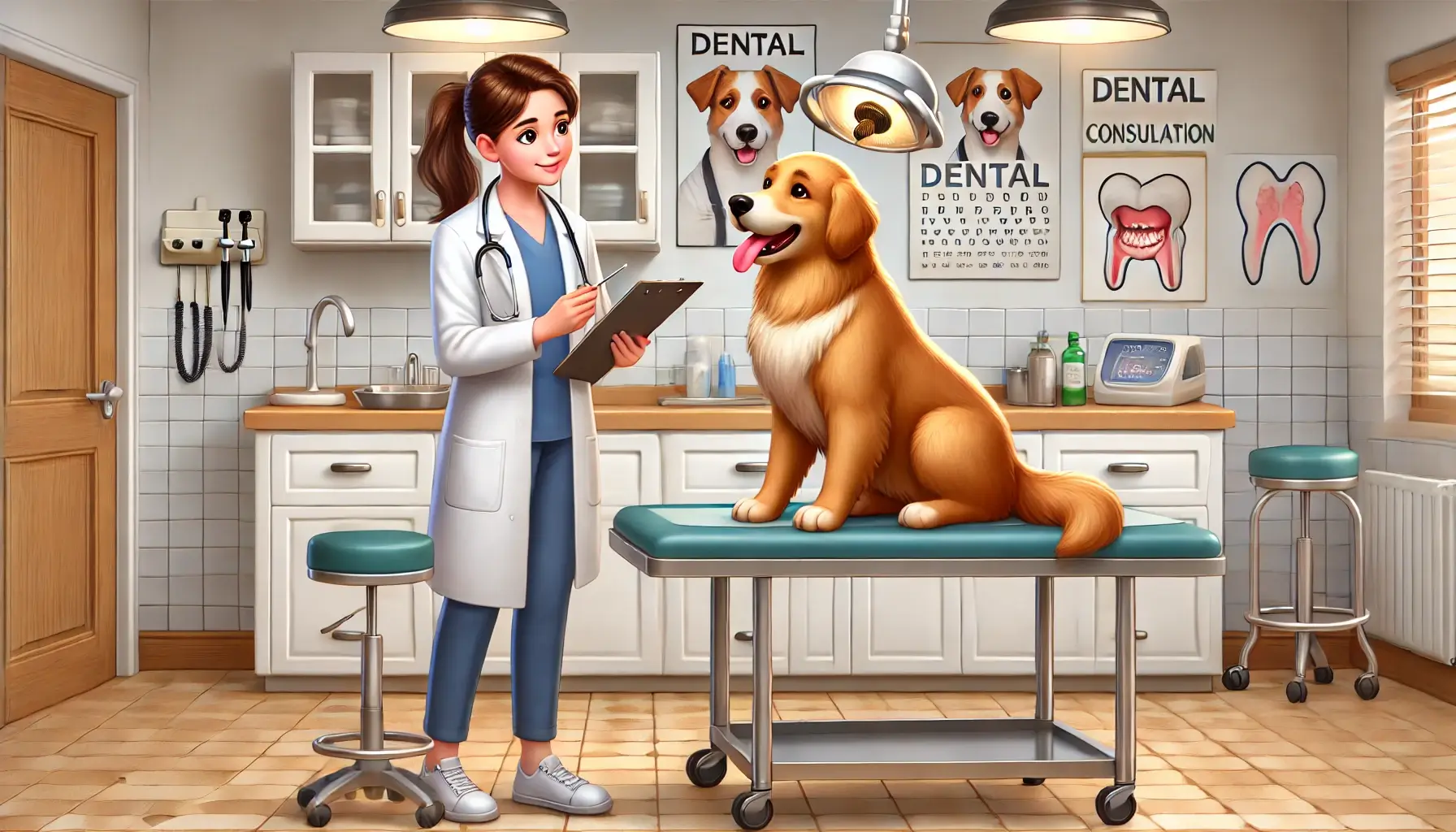
Average Cost of Dog Dental Implants
Dog dental implants can be costly, with those for dogs averaging between $2,000 and $5,000 per tooth. The cost of routine services such as vaccinations and neutering also vary by region since urban areas with specialty veterinary clinics often have higher fees than rural areas.
Several factors are included in the total cost: The first consultation and evaluation, X-rays or CT scans, surgical implantation including other logical methods of surgery, and follow-up care for that healing. Additionally, some clinics provide packages that include the entire process, while others may bill for stages separately.
Factors That Affect the Cost
There are multiple factors that determine how much dog dental implants cost. A key reason is the canine’s size, as bigger breeds normally want bigger and more sturdy implants, driving up prices.
The complexity of the case is a factor, too. If the dog has existing oral health problems, like gum disease or bone loss, further treatment will be needed before the implant can be fitted. “Veterinary dental surgeons who have experience and advanced training can also charge high rates, adding to the bill,” he said.
Is the Cost Worth It for Your Pet?
Whether you are involved the expense of dog dental implants is worth it, will depend on your dog’s needs & quality of life. For pets undergoing major dental surgery, including severe dental disease, implants to replace lost teeth ensure normal eating habits and improve overall health, as well as quality of life.
Pet-debt implants have led to remarkable transformations in their dogs’ behavior and vitality, say many pet owners who have chosen them. One involved a senior dog that after implantation once again ate solid food, adding years to its life, so began to say they were working on year-long implants. Weighing up the cost compared to these positive effects is important since the procedure can transform the lives of some pets.
Where to Get Dental Implants for Dogs?
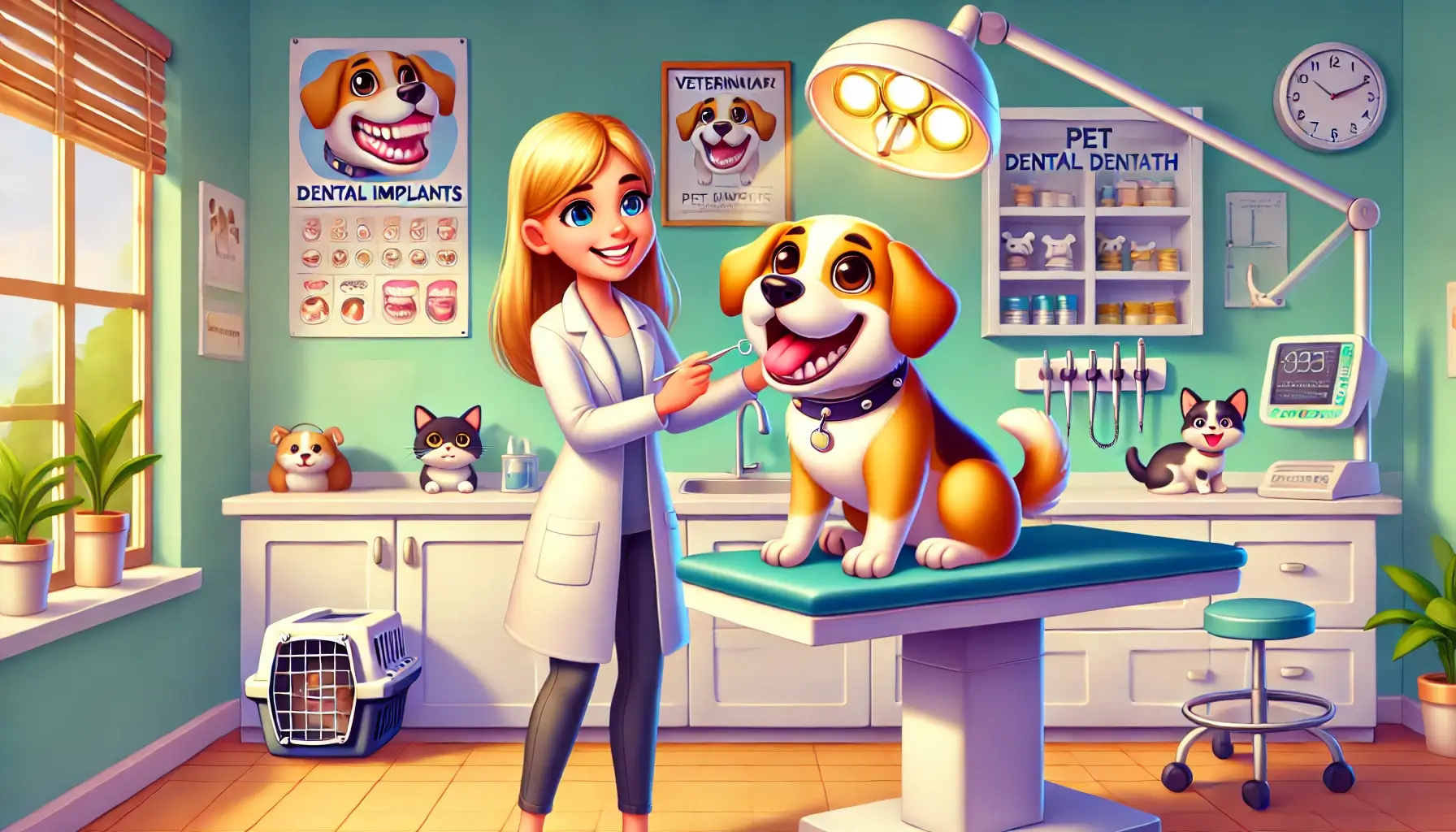
Finding Qualified Veterinary Dentists
Selecting the appropriate vet dentist is very important for the dental implant process on your dog. Begin with research on specialists in your location. Seek those holding credentials from recognized organizations, such as the American Veterinary Dental College (AVDC) or similar agencies within your area. These accreditations denote additional training and experience in veterinary dentistry.
Check reviews and testimonials from other pet owners to get a sense of the specialist’s reputation. A visit to the clinic in person can also give you an opportunity to evaluate the clinic’s cleanliness, equipment, and surrounding environment. It is important to choose a dentist that puts your dog’s safety and comfort first.
Questions to Ask Before the Procedure
If you’re thinking about the procedure, you’ll want to ask the specialist some important questions before proceeding. First, ask if dental implants work well in dogs and if your dog is a good candidate for this procedure. Knowing the risks and the expected outcomes will prepare you to make an informed decision.
Review the post-surgical care needs. Questions such as, “What should I be feeding my dog while it recovers?” or “How can I stop my dog from ruining the implant?” are important. Also, ask about possible complications and how they will be managed. Knowing the whole process helps ensure that you’re ready to give your dog the best care possible.
Are There Alternatives to Dog Dental Implants?
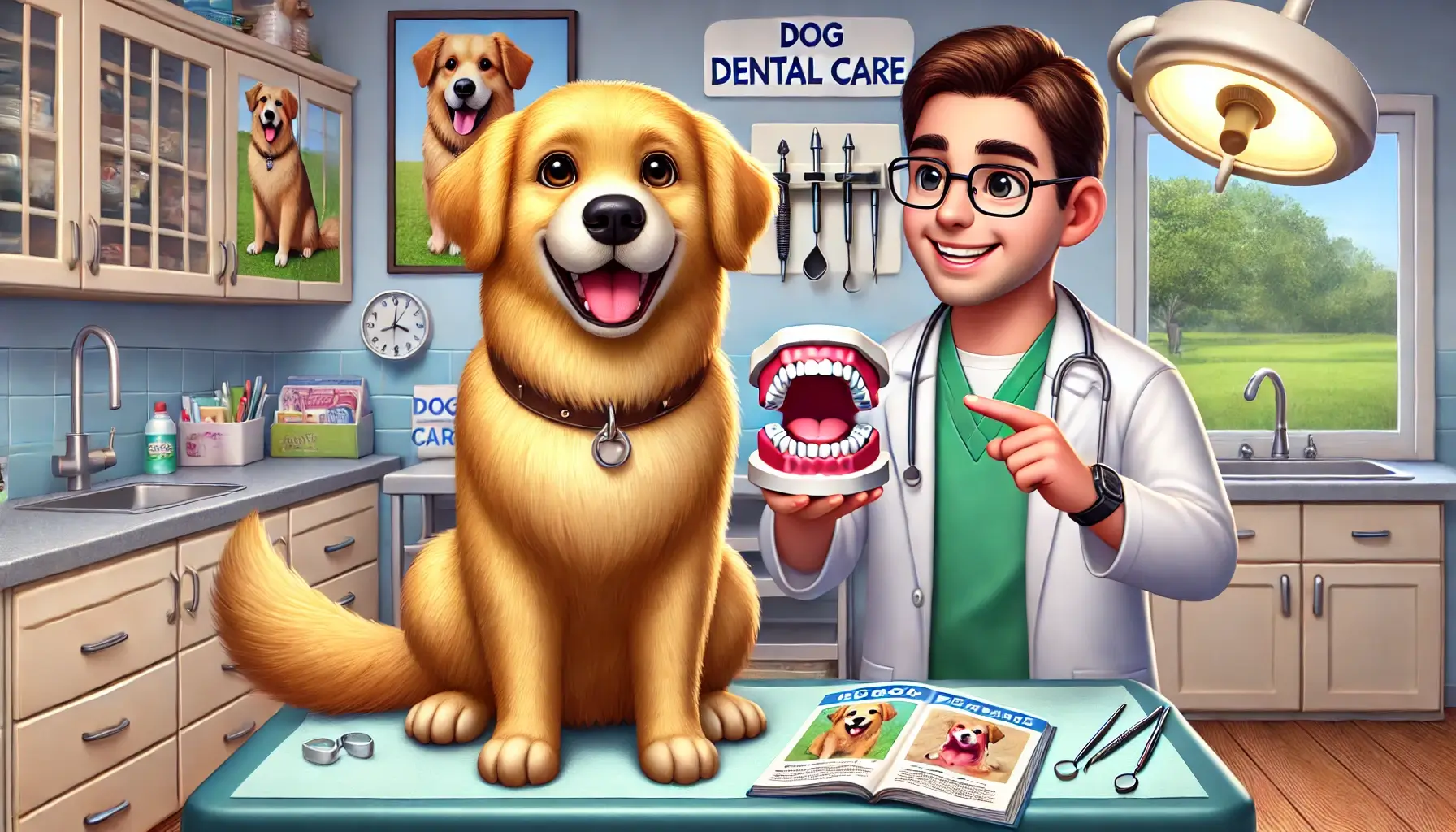
Standard Canine Oral Care Measures
Regular brushing is the best way to keep your dog’s teeth clean and reduce the risk of expensive implants. Regularly brushing your dog’s teeth with pet-safe toothpaste can minimize plaque buildup and decay.
Brushing may be a challenge, so dental chews can work in a pinch. These are unique treats that help clean teeth as your dog munches on a tasty snack.
Another important measure is professional dental cleaning by a vet. Routine check-ups and cleanings allow for dental problems to be diagnosed and treated as early as possible. These prophylactic measures are more cost-effective and less invasive than more advanced treatments like implants.
Other Dental Solutions for Dogs
If implants are not a viable choice for your dog, other dental alternatives may be available. Dental bridges, for instance, can replace gaps created by missing teeth. They serve the same function for chewing but are less invasive than implants and not as durable.
Dentures or removable devices represent another option, but these are less common in the field of veterinary dentistry. They are a solution to help restore some chewing ability in dogs with several missing teeth.
If replacement isn’t needed, just having a tooth extracted can alleviate pain and stop infection.
Although your dog might require some modifications to their diet, many dogs do well with a few fewer teeth in their mouths! Talk to your vet about these options, to determine what’s best for your pup.
Real-Life Case Studies: Success Stories of Dog Dental Implants
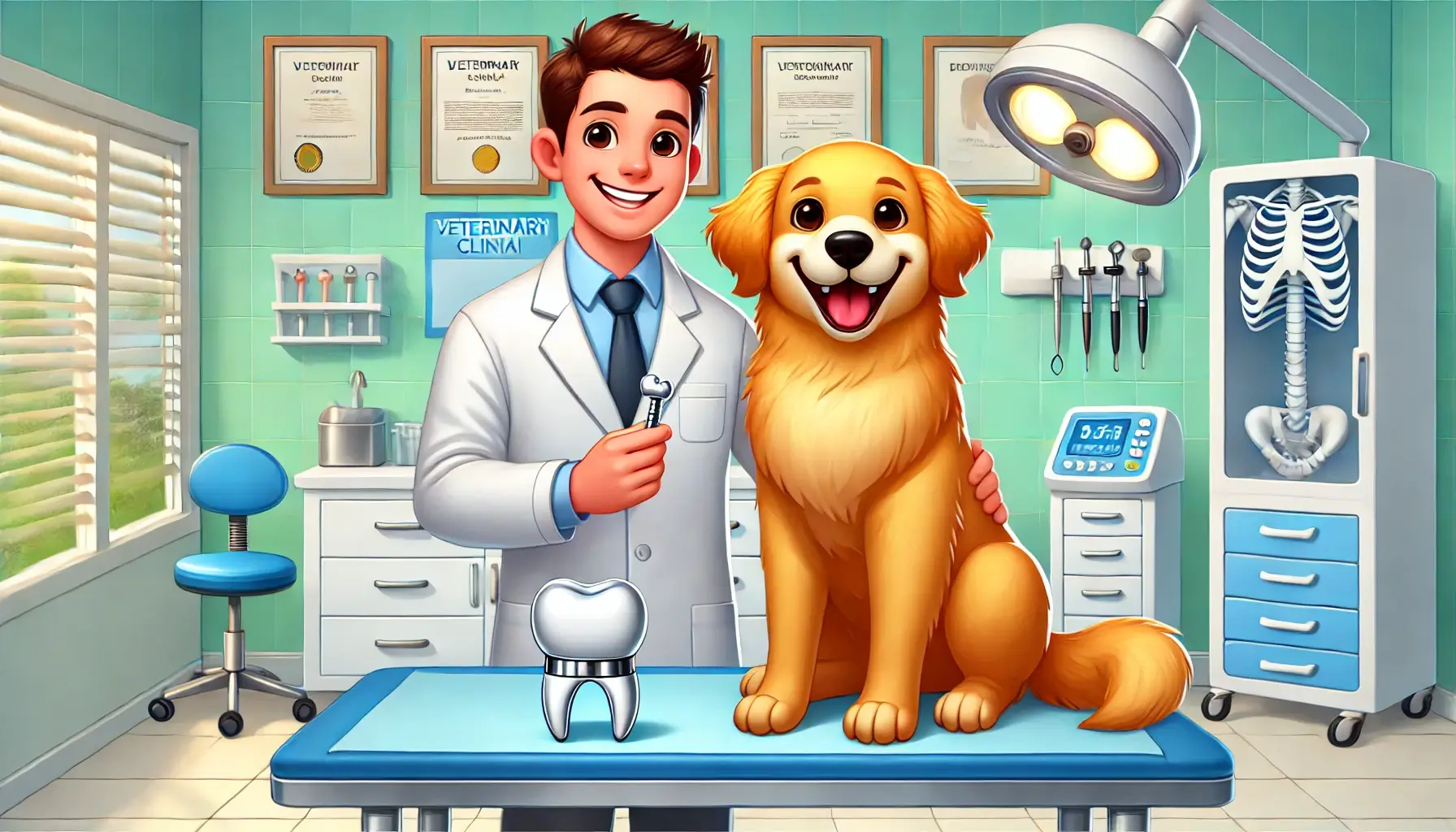
Overview of Three Cases
Case 1: Max, the Working Dog
Max, a 5-year-old German shepherd, had two molars that were removed during an accident. He had difficulty eating and working effectively. Max went back to his active lifestyle following his dental implants, and his strength and energy returned. As his owner noted, “It’s like he’s a puppy again!”
Case 2: Bella, the Senior Poodle
Bella, an 11-year-old Poodle, had advanced gum disease and lost three of her teeth. In the months between, getting implants helped her chew soft foods and made her comfortable. Her vet said that her gums healed well after the procedure, and Bella seemed to have more energy.
Case 3: Rocky, the Rescue Pitbull
Rocky had been rescued after neglect had damaged his teeth. His new owner chose implants to repair his smile and his health. Rocky is doing well today and his implants are working great, so he can eat and chew on his toys.
Before and After Photos
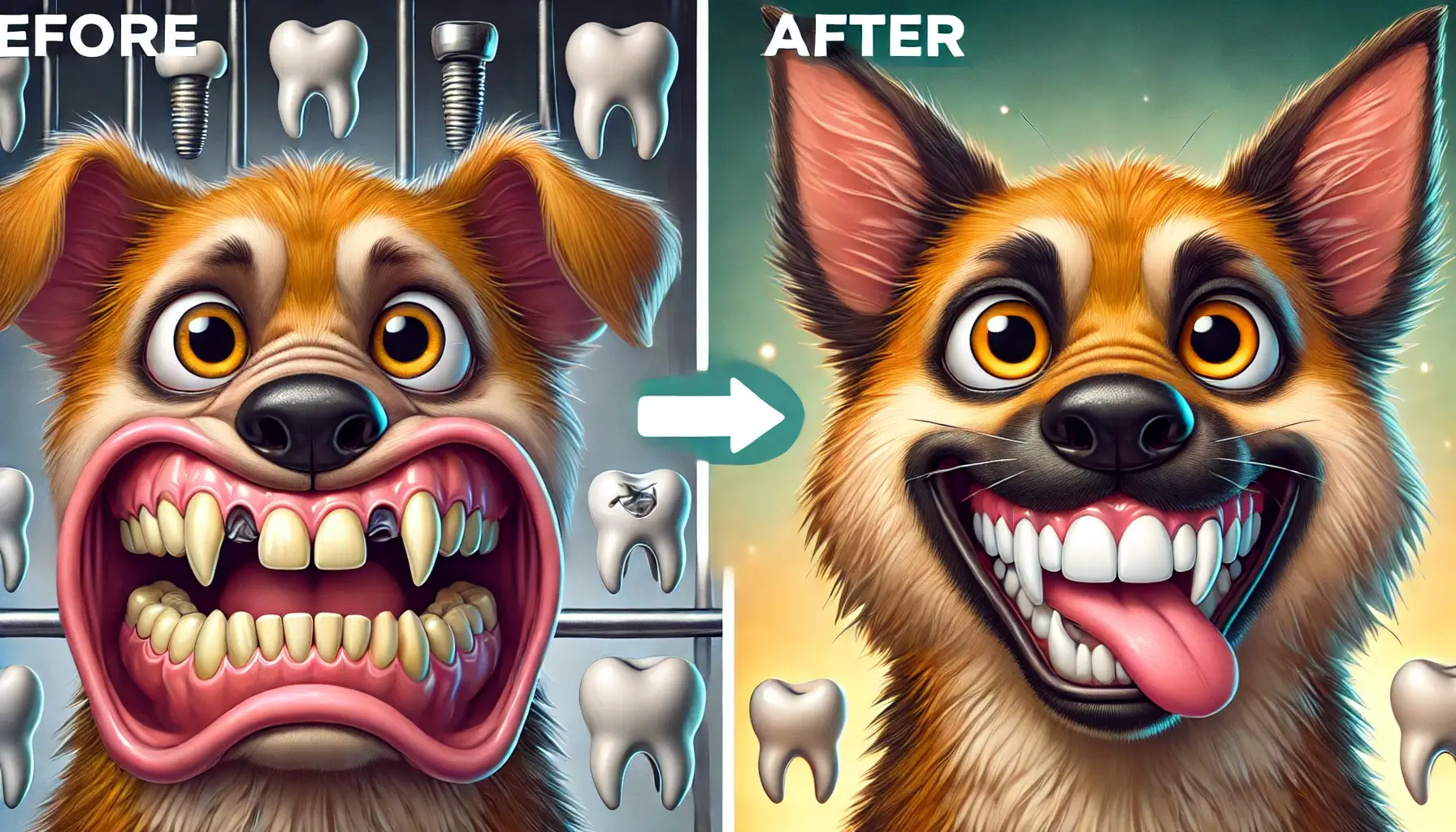
Outcomes and Feedback from Pet Owners
Owners regularly report improved eating habits, health, and happiness in their dogs. They stress that the procedure was worth the expense, as it greatly improved their pets’ quality of life.
FAQs About Dog Dental Implants
Do Dental Implants Ever Fail in Dogs?
A dental implant may fail if it does not heal properly, is infected, or is due to poor oral hygiene. Frequent monitoring with maintenance lowers the likelihood of a breakdown.
How Long Does the Process Take?
The actual process of implantation under anesthesia takes roughly 1-2 hours. Healing and integration with the jawbone will take longer between 2-4mths
Do Dogs Experience Pain with Implants?
Dogs are under anesthesia and do not feel pain during the procedure. Recovery is usually swift, and post-operative pain can be controlled with medication.
Conclusion: Is a Dental Implant Right for Your Dog?
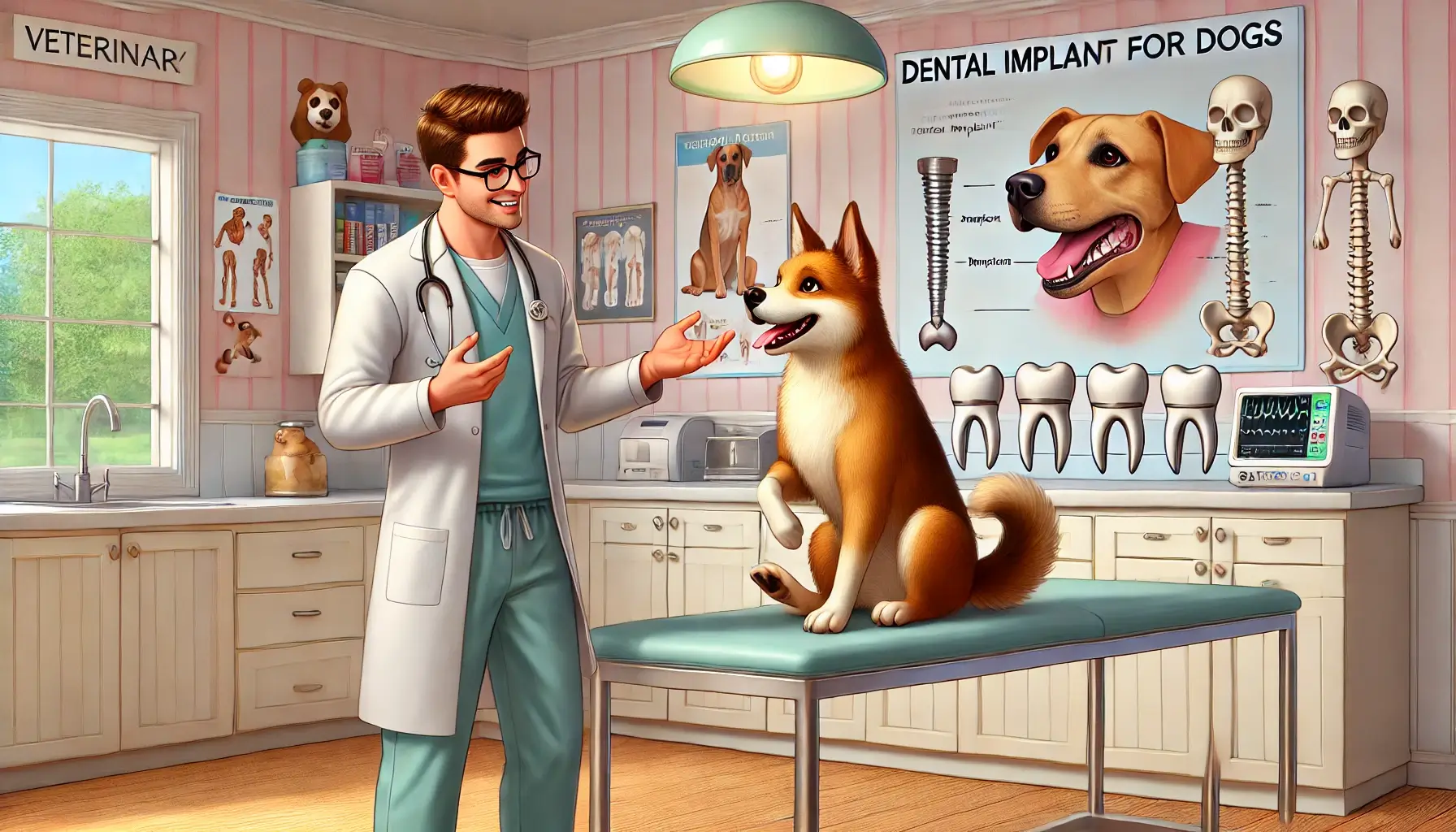
When deciding upon the best option to restore your canine’s smile, it is important to consider the benefits, risks, and alternatives to dental implants.
Dental implants can greatly increase the quality of life for your dog by making chewing easier and helping to keep up with oral health and management because continued oral health is even more important with missing teeth as more complications arise.
Such benefits are great news for dogs with major dental problems or who depend on their strong teeth for their daily tasks.
However, there are risks associated with the procedure, including complications during surgery and the possibility of implant rejection. It’s important to balance these considerations against the potential for improvements in your dog’s comfort and health.
Another major consideration is the costs, which can vary depending on region, dog size, and case complexity.
The last resort for some pet owners is dental bridges, dentures, or extractions. In addition to dental procedures, standard oral care measures, including brushing and professional cleanings, are key to maintaining your dog’s dental health and preventing future problems.
The ultimate decision depends on your dog’s unique needs, your budget, and advice from a qualified veterinary dentist. It’s best to consult a certified specialist to determine if your dog qualifies and to facilitate the best possible outcome.
With thoughtful consideration and appropriate care, you can make the right decision for your furry friend’s longevity and quality of life.
Popular Article
Dental Health in Dogs Guidelines
Dental disease dog teeth cleaning before and after
How long do dog dental cleanings take
What to Feed Dog After Dental Cleaning
Can dog annual vaccinations be done during dental cleaning
How often do dogs need dental cleaning
Clindamycin dosage for dog’s dental
cobber dog health issues
Dog Heat Cycle Calculator
chinook dog health issues


